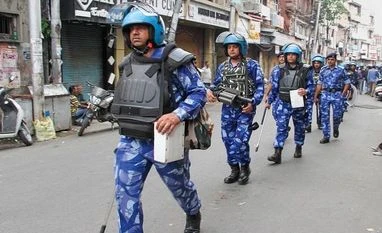Haider (Shahid Kapoor), the protagonist in Vishal Bharadwaj’s eponymous adaptation (2014) of William Shakespeare’s Hamlet, returns home to Srinagar from Aligarh, where he is a student, after the arrest and “disappearance” of his father, Dr Hilal Meer (Narendra Jha). He finds his hometown under a curfew imposed by the Indian Army and the constant threat of militancy and terror attacks in the air. He tells his friends, Salman and Salman (Sunil Kaul and Rajat Bhagat) — Rosencrantz and Guildenstern — that he is determined to find his father. “Where? In camps?” they ask him. “In prisons?” Haider replies: “All of Kashmir is a prison my friends.”
The film is set in 1995, when Kashmir was in the grip of a violent separatist movement — often supported and abetted by Pakistan — and reeling from an equally violent repression of it by the Indian Army. But can you really blame Kashmiris, especially in the Indian side, if they harbour similar feelings now, after the manner in which the Centre decided to clamp down on means of communication, spread rumours of a possible terror attack to beef up security, put elected leaders of the state under house arrest, and unilaterally bifurcate it and transformed it into a Union territory? (On Thursday evening, Prime Minister Narendra Modi said in an address to the nation that Jammu & Kashmir’s statehood would be restored, but provided no timeline for it.) Since Monday, when Home Minister Amit Shah introduced the Bill to reorganise the state in the Rajya Sabha, a question that has been frequently asked is: Does the world’s largest democracy behave like this with its citizens?
In the preface to the published manuscript of Haider, Bharadwaj explains why he chose to set his adaptation of Hamlet in the Valley: “I strongly feel that Kashmir has been the biggest tragedy of modern Indian history and no film has been made to capture the real tragedy of what has been going on there for the last 25 years. I began to read Basharat’s (Kashmiri journalist Basharat Peer’s) book (Curfewed Nights) with Hamlet in mind and by the time I finished it I had decided to collaborate with him.” Peer is the co-author of the film’s script.
Some critics have claimed that Haider is the least effective in Bharadwaj’s Shakespeare trilogy. The original is also a rather complicated structure, with the narrative depending in many ways on whether Hamlet believes the claim of his father’s ghost that his uncle Claudius had committed fratricide. Bharadwaj uses the character of Roohdaar (Irfan Khan) — as survivor of Indian prison camps and a possible militant leader — as the “ghost” in the realistic world of Haider. He brings the message of revenge to the protagonist — revenge for the murder of his father, the seduction of his mother, and in some ways, revenge for Kashmir. In the end, however, Haider’s refusal to kill his uncle, Khurram (Kay Kay Menon) — a marked departure from the original — eschews the violence that begets more violence.
Another significant aspect of this adaptation is how Bharadwaj dovetails the Gravedigger scene in Hamlet with his commentary on the unmarked graves of people killed in Kashmir’s violence in a song towards the climax of the film:
A Guardian report from 2011 claimed that thousands had been buried in unmarked graves in North Kashmir: “More than 2,000 corpses, believed to be victims of Kashmir’s long-running insurgency, have been found buried in dozens of unmarked graves in the divided region, an Indian government human rights commission report has said.” It goes on to claim: “Up to 70,000 people died in the 22-year insurgency in Kashmir, which pitted armed separatist groups, many backed by Pakistan, against New Delhi’s rule.”
The unmarked graves were evoked quite poignantly by poet Arundhati Ghosh in her poem “Article 370”, published online earlier this week:
“Will you cleanse it of mass graves before you buy land in Kashmir
Or bury the undead—”
Ghosh is referring to the glee with which Indians in many parts of the country have responded to the abrogation of certain sections of Article 370 — some vitals parts of the instrument through which the erstwhile princely state of Kashmir had joined India in 1947. It also prevented non-Kashmiris from buying land in the hilly state.
Soon after Home Minister Shah introduced the Bill of the reorganisation of the state in Parliament, a message started doing the rounds on social media claiming land was available for sale in Srinagar’s historic Lal Chowk. The Vice analysed data from Google Trends to show that searches ‘Move to Kashmir’, ‘How to buy property in Kashmir’ and ‘Buy land in Kashmir’ were trending on the search engine: “those planning to buy property in Kashmir are mostly from Delhi, followed by Haryana and Jharkhand”.
Bharadwaj would have also been well aware of the unmarked graves when he made his film. That he could represent not only this, but also the overreaches of the Armed Forces Special Powers Act in a mainstream film is testimony to the health of Indian democracy, which enshrines free speech. But it has been repeatedly called into question over the past few days due to the strong-arm actions of the government in Kashmir. To surrender to the self-congratulatory mood in various sections of the Indian population over the government’s actions would be to concede democratic space without a struggle. And, that would be a pity.
Unlock 30+ premium stories daily hand-picked by our editors, across devices on browser and app.
Pick your 5 favourite companies, get a daily email with all news updates on them.
Full access to our intuitive epaper - clip, save, share articles from any device; newspaper archives from 2006.
Preferential invites to Business Standard events.
Curated newsletters on markets, personal finance, policy & politics, start-ups, technology, and more.
)